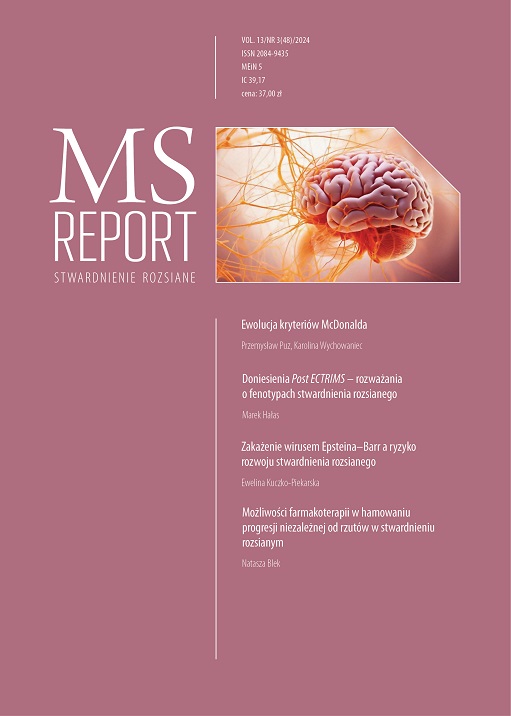Reports from Post-ECTRIMS – reflections on multiple sclerosis phenotypes Review article
Main Article Content
Abstract
In current clinical practice, we use the classification of multiple sclerosis proposed by prof. Fred Lublin in 1996, which was subsequently revised in 2013. During the recent ECTRIMS conference (European Committee for Treatment and Research in Multiple Sclerosis), potential new phenotypes of this disease were discussed. New data suggest that multiple sclerosis is a condition with a broad spectrum of symptoms, and factors influencing its course can occur at any stage of the disease, with varying severity. Progression plays a key role in the course of the disease and may begin even before the diagnosis is made. New classifications might include clinical, radiological, neuropsychological factors, and biomarkers, enabling more accurate disease course predictions and optimal timing of treatment implementation.
Article Details
Copyright © by Medical Education. All rights reserved.
References
2. Lublin FD, Reingold SC, Cohen JA et al. Defining the clinical course of multiple sclerosis. The 2013 revisions. Neurology. 2014; 83(3): 278-86.
3. Lublin FD, Häring DA, Ganjgahi H et al. How patients with multiple sclerosis acquire disability. Brain. 2022; 145(9): 3147-61.
4. Pitt D, Lo CH, Gauthier SA et al. Toward Precision Phenotyping of Multiple Sclerosis. Neurol Neuroimmunol Neuroinflamm. 2022; 9(6): e200025.
5. Eshaghi A, Young AL, Wijeratne PA et al. Identifying multiple sclerosis subtypes using unsupervised machine learning and MRI data. Nat Commun. 2021; 12(1): 2078.
6. De Meo E, Portaccio E, Giorgio A et al. Identifying the Distinct Cognitive Phenotypes in Multiple Sclerosis. JAMA Neurol. 2021; 78(4): 414-25.
7. Zamecnik CR, Sowa GM, Abdelhak A et al. An autoantibody signature predictive for multiple sclerosis. Nat Med. 2024; 30(5): 1300-8.
8. Tur C, Carbonell-Mirabent P, Cobo-Calvo Á et al. Association of Early Progression Independent of Relapse Activity With Long-term Disability After a First Demyelinating Event in Multiple Sclerosis. JAMA Neurol. 2023; 80(2): 151-60.
9. Portaccio E, Bellinvia A, Fonderico M et al. Progression is independent of relapse activity in early multiple sclerosis: a real-life cohort study. Brain. 2022; 145(8): 2796-805.

